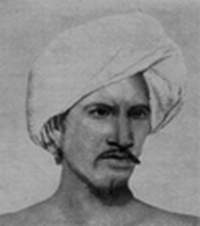Man, you should explode
Yourself to bits to start with
Jive to a savage drum beat
Smoke hash, smoke ganja
Chew opium, bite lalpari
Guzzle country booze—if too broke,
Down a pint of the cheapest dalda
Stay tipsy day and night, stay tight round the clock
Cuss at one and all; swear by his mom’s twat, his sister’s cunt
Abuse him, slap him in the cheek, and pummel him…
Man, you should keep handy a Rampuri knife
A dagger, an axe, a sword, an iron rod, a hockey stick, a bamboo
You should carry acid bulbs and such things on you
You should be ready to carve out anybody’s innards without batting an eyelid
Commit murders and kill the sleeping ones
Turn humans into slaves; whip their arses with a lash
Cook your beans on their bleeding backsides
Rob your next-door neighbours, bust banks
Fuck the mothers of moneylenders and the stinking rich
Cut the throat of your own kith and kin by conning them; poison them, jinx them
You should hump anyone’s mother or sister anywhere you can
Engage your dick with every missy you can find, call nobody too old to be screwed
Call nobody too young, nobody too green to shag, lay them one and all
Perform gang rapes on stage in the public
Make whorehouses grow: live on a pimp’s cut: cut the women’s noses, tits
Make them ride naked on a donkey through the streets to shame them
Man, one should dig up roads, yank off bridges
One should topple down streetlights
Smash up police stations and railway stations
One should hurl grenades; one should drop hydrogen bombs to raze
Literary societies, schools, colleges, hospitals, airports
One should open the manholes of sewers and throw into them
Plato, Einstein, Archimedes, Socrates,
Marx, Ashoka, Hitler, Camus, Sartre, Kafka,
Baudelaire, Rimbaud, Ezra Pound, Hopkins, Goethe,
Dostoevsky, Mayakovsky, Maxim Gorky,
Edison, Madison, Kalidasa, Tukaram, Vyasa, Shakespeare, Jnaneshvar,
And keep them rotting there with all their words
One should hang to death the descendents of Jesus, the Paighamber, the Buddha, and Vishnu
One should crumble up temples, churches, mosques, sculptures, museums
One should blow with cannonballs all priests
And inscribe epigraphs with cloth soaked in their blood
Man, one should tear off all the pages of all the sacred books in the world
And give them to people for wiping shit off their arses when done
Remove sticks from anybody’s fence and go in there to shit and piss, and muck it up
Menstruate there, cough out phlegm, sneeze out goo
Choose what offends one’s sense of odour to wind up the show
Raise hell all over the place from up to down and in between
Man, you should drink human blood, eat spit roast human flesh, melt human fat and drink it
Smash the bones of your critics’ shanks on hard stone blocks to get their marrow
Wage class wars, caste wars, communal wars, party wars, crusades, world wars
One should become totally savage, ferocious, and primitive
One should become devil-may-care and create anarchy
Launch a campaign for not growing food, kill people all and sundry by starving them to death
Kill oneself too, let disease thrive, make all trees leafless
Take care that no bird ever sings, man, one should plan to die groaning and screaming in pain
Let all this grow into a tumour to fill the universe, balloon up
And burst at a nameless time to shrink
After this all those who survive should stop robbing anyone or making others their slaves
After this they should stop calling one another names white or black, Brahmin, Kshatriya, Vaishya, or Shudra;
Stop creating political parties, stop building property, stop committing
The crime of not recognising one’s kin, not recognising one’s mother or sister
One should regard the sky as one’s grandpa, the earth as one’s grandma
And coddled by them everybody should bask in mutual love
Man, one should act so bright as to make the Sun and the Moon seem pale
One should share each morsel of food with everyone else, one should compose a hymn
To humanity itself, man, man should sing only the song of man.
Found that Marathi poem by Namdeo Dhasal (from Golpitha, 1972), translated by Dilip Chitre, at the Almost Island site.
